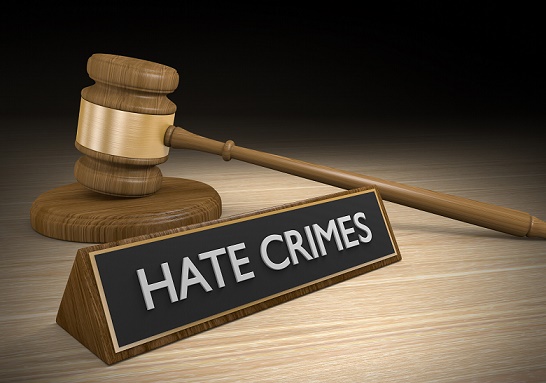by Gordon Jeremiah Berry
Hate crime acts are defined by a Federal Law, U.S. Code 249 as: Offenses Involving Actual or Perceived Race, Color, Religion, or National Origin. Whoever, whether or not acting under color of law, willfully causes bodily injury to any person or, through the use of fire, a firearm, a dangerous weapon, or an explosive or incendiary device, attempts to cause bodily injury to any person, because of the actual or perceived race, color, religion, or national origin of any person.
Other stipulations also include, gender identity and disability as well as the other criminal offenses that include death from the offense or the kidnapping or an attempt to kidnap, aggravated sexual abuse or an attempt to commit aggravated sexual abuse, or an attempt to kill.
According to FBI’s (Federal Bureau of Investigation) statistics for 2014, the hate crime breakdown comprises 47.0% racial, 18.6% religious, 18.6% sexual orientation, 11.9% ethnicity, 1.8% gender identity, 1.5% disability, and 0.6% gender-based crime.
A further look into the numbers of 2014 was a study done that involved 6,418 reported hate crimes offenses, 63.1% percent were crimes against persons and 36.1 percent were crimes against property. The remaining offensives were crimes against society, like illegal drug activity or prostitution. The majority of the 4,048 reported crimes against persons involved intimidation (43.1% percent) and simple assault (37.4 percent). Most of the 2,317 hate crimes against property were acts of destruction, damage, and vandalism (73.1% percent). Individuals were the most common victim of a single-bias hate crime, accounting for 82.4% percent of the reported 6,418 offenses. The remaining victim’s types were businesses, financial institutions, religious organizations, government, and society or the public.
In an even deeper look into hate-crime legislation is the findings that some states are non-inclusive, meaning not all states follow all elements within the Federal Law. This is allowed due to individual state rights and each individual State(s) possessing separate Constitution(s) Law(s). This would include “the obligation to recognize data collection for hate crimes”. Such States are: Alabama, Alaska, Arkansas, Georgia, Idaho, Mississippi, Montana, North Carolina, North Dakota, Ohio, Oklahoma, Pennsylvania, South Carolina, South Dakota, Virginia, West Virginia, and Wyoming.
Within these States is the very real possibility that hate-crimes could actually be higher in number due to the States’ non-reporting obligation of data on such criminal offensives. Therefore, the only way such crimes could be reported and included into the FBI’s data for record-keeping is for the victims of such crimes to seek assistance from such organizations such as the NAACP (National Association for the Advancement of Colored People), or by contacting a civil rights attorney.
Criminal penalties for hate crime vary from state to state but most hate crimes are felonies and are crimes punishable by more than one year in prison. Under federal hate crime legislation, bias-motivated violence is punishable by ten years to life in prison, and some bias-motivated crimes are punishable by the death penalty.
Within every law no matter criminal or civil. Legalese is often used, the term “legalese” meaning is the language used by lawyers that is difficult for most people to understand. Also known as legal jargon, and the laws that are relating to criminal hate crimes are no different.
Laws such as Mens Rea, are incorporated in criminal cases. Mens Rea, is a Latin term meaning “guilty mind”. In the American legal system, every crime has two components which the prosecution must prove to obtain a conviction of the defendant. One, actus reus, or the criminal action, and two, mens rea, the criminal intent. If either component is missing, the defendant will be acquitted. The burden of proof always falls on the prosecution side.
Yet, criminal intent does not necessarily mean “malicious intent”, and a person can be found to have criminal intent even where his motives are objectively good. The levels of mens rea, range from no intent, to the level of intent required to obtain a death penalty verdict in a first degree murder trial and everything in between.
Ranges widen out from malice aforethought, intentional, knowing, reckless disregard, and strict liability, which is rare in criminal cases. Other less used methods are mental capacity, acquittal in spite of proven mens rea, (such as in cases involving self-defense).
Also, there is “Ignorance of the Law”, in the U.S. legal system, a person is liable for the legal effects of intended acts or willfulness, thus this is an element of a crime, meaning that the defendant knowingly and intentionally violated a law, ignorance of the law would be a defense to that element.
Civil Rights Violations are also a possibility. In 31 states and the District of Columbia, under the “civil cause of action” people who commit violence, intimidation, or vandalism may also be sued in civil court and ordered to pay damages (money) to the victim. The amount totals vary from state to state within the civil liability laws.
In most cases, under federal laws and state laws statutes, for crimes that have been found to cause to a lesser degree any of the following in exact accordance of the law. Offenses involving actual or perceived race, color, religion, or national origin, whether or not acting under color of law, willfully causes bodily injury to any person or, through the use of fire, a firearm, a dangerous weapon, or an explosive or incendiary device, attempts to cause bodily injury to any person, because of the actual or perceived race, color, religion, or national origin shall be imprisoned not more than 10 years, fined in accordance with this title, or both.
In cases involving more serious crimes, and have been found to have cause great harm to a major degree any of the following in exact accordance of the law. They shall be imprisoned for any term of years or for life, fined in accordance with this title, or both. Offenses that willfully causes bodily injury to any person or through the use of fire, a firearm, a dangerous weapon, or an explosive or incendiary device, attempts to cause bodily injury to any person, because of the actual or perceived religion, national origin, gender, sexual orientation, gender identity, or disability of any person. Shall be sentenced to any of the following, shall be imprisoned to not more than 10 years, fined in accordance with this title, or both. Shall be imprisoned for any term of years or for life, fined in accordance with this title or both, if death results from the offense.
The guidelines for the Federal Laws being enforced shall be undertaken pursuant to guidelines issued by the Attorney General, to be included in the United States Attorney’s Manual that shall establish neutral and objective criteria for determining whether a crime was committed because of the actual or perceived status of any person.
Other qualifications must conclude that, no persecution of any offense described in the subsection may be undertaken by the United States, expect under the certification in writing of the Attorney General, or a designee, that concludes that, first, the State does not have jurisdiction. Second, the State has requested that the Federal Government assume-jurisdiction. Third, the verdict or sentence obtained pursuant to State charges left demonstratively un-vindicated the Federal interest in eradicating bias-motivated violence. Fourth, a prosecution by the United States is in the public interest and necessary to secure substantial justice.
In conclusion, we live in a very scary political environment. As the people stand to fight the government(s) over more control, hoping to end up with a little more (rights), in the end, we may all end up with less. Having hate crime law(s) can’t solve the problem of (hate); rather, it attempts to put a Band-Aid over a deep flesh wound to its victims. Discrimination against someone for any reason is a hate-crime. Individuals or groups of people that hate to reflect their “want of the heart” need to blame others for the conditions they perhaps helped create, or are the victims of the conditions, which someone else created, while never having any type of control over them, from the start.”
About the Author
Gordon Jeremiah Berry, is an avid reader and intense researcher. Mr. Berry looks for the deeper meaning behind all things. His favorite saying is “Love must always win out!”


